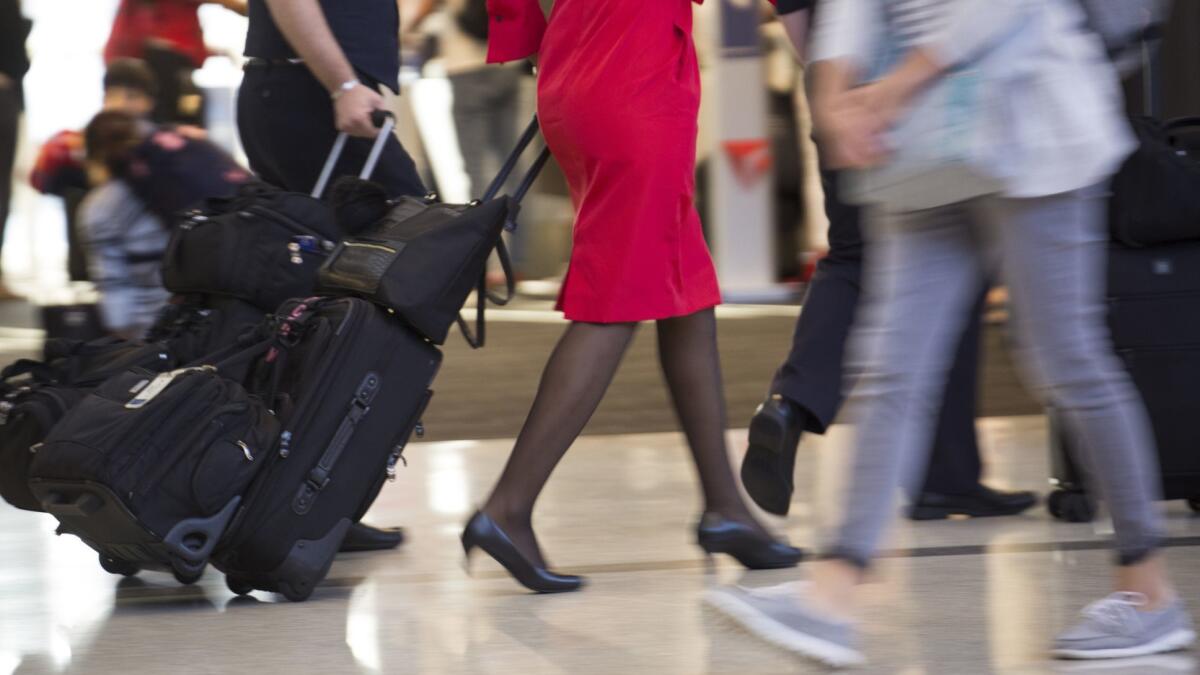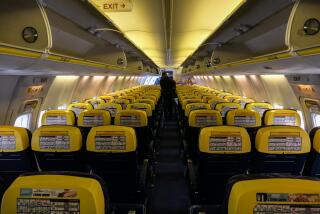That flight attendant in a passenger seat? He’s not on duty so leave him alone

There are Deadheads. And then, in my business, there are deadheads.
Unlike the rock-music-swaying, tie-dyed T-shirt-wearing Deadheads who faithfully traveled to Grateful Dead concerts, airline crew deadheads travel at the behest of their employer. Officially on duty but not part of the working crew, deadheading crew members fly across the country and around the world, dressed in uniform, occupying a passenger seat, hurtling toward another crew repositioning mission.
Why do you need to know this? It might explain why we are not our usual helpful selves.
Let’s say that during a layover in São Paulo, Brazil, a Los Angeles-based flight attendant comes down with the flu. She or he will call the lead flight attendant who will notify crew scheduling that she/he can’t work the return flight. Crew scheduling then contacts a reserve flight attendant. The assignment? Fly from Los Angeles to São Paulo, then work the São Paulo-Los Angeles flight in place of the ailing crew member.
If flight schedules don’t allow the deadheading flight attendant to reach São Paulo in time to work the flight, it may depart understaffed. If the ailing crew member happens to be a pilot, however, the flight could be delayed until a deadheading pilot arrives and gets enough rest to work the trip.
During three decades as a flight attendant, I’ve deadheaded perhaps 300 or more times. I’ve deadheaded abroad to replace sick colleagues. I’ve deadheaded back to base after an illness forced me from working a flight. I’ve deadheaded as part of a scheduled trip sequence and as part of a trip sequence made up entirely on the fly (no pun intended).
My most recent deadheading experience occurred on the second day of a two-day trip in May.
I was part of a four-flight-attendant crew and was scheduled to work from Dallas to Indianapolis, back to Dallas and finally to Miami. Because of weather in Indianapolis, our inbound and outbound flights were delayed. By the time our plane landed about 9 p.m. in Dallas, the 8 p.m. Miami flight we had been scheduled to work had departed, staffed with standby flight attendants from our crew base in Dallas.
A decade ago, we would have learned of about our trip plans from the pilots.They typically received updated information from crew scheduling and passed it on by radio to the flight attendants.
Now there’s an app for that. Thanks to smartphone technology, pilots and flight attendants can tap on a crew application and get up-to-the-minute reassignment information. Instead of working a 10 p.m. Miami flight, we flight attendants were scheduled to deadhead on it.
Most flight attendants would rather deadhead than work a flight. After all, a deadhead relaxing in a passenger seat is paid the same as a working crew member. But deadheading in uniform comes with its own problems: Passengers assume we are part of the working crew.
A couple of years ago, after completing a two-day annual training course, I deadheaded on a flight from company headquarters to my home base. Wearing a flight attendant uniform, silver wings gleaming on my uniform shirt, I stowed my carry-on in an overhead bin and plopped down in my assigned seat.
As the procession of passengers came down the aisle, I closed my eyes and drifted off, soothed by the music from my ear buds.
Suddenly, I felt a jabbing sensation in my ribs. My eyes flew open. There, towering over me, was a woman wearing a look of disdain.
“I need you to help lift my bag,” she said, glancing at an open overhead bin.
From a slouched position, I sat up in my seat and apologized. Without using the word “deadhead,” I politely told her that I wasn’t part of the working crew. (I chose not to mention that passengers must lift and stow their own carry-on luggage, which might have started an argument.)
Her response was swift and perplexing. “I’ll remember this!” she said, stabbing her index finger at my face. She then turned to the man standing next to her (I learned later he was her husband) and he lifted the bag.
Perhaps upon seeing me — a uniformed flight attendant — lounging in a passenger seat, the woman was outraged by my apparent dereliction of duty. Or maybe it was something else entirely. Either way, I chalked it up as another lesson learned.
Now, whenever I’m deadheading, I cover my uniform shirt with a sweater and conjure up lyrics from the Grateful Dead’s “Attics of My Life”:
“When I had no wings to fly
“You flew to me
“You flew to me.”
More to Read
Sign up for The Wild
We’ll help you find the best places to hike, bike and run, as well as the perfect silent spots for meditation and yoga.
You may occasionally receive promotional content from the Los Angeles Times.






